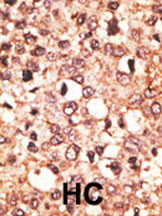

| WB | 咨询技术 | Human,Mouse,Rat |
| IF | 咨询技术 | Human,Mouse,Rat |
| IHC | 1/100-1/500 | Human,Mouse,Rat |
| ICC | 技术咨询 | Human,Mouse,Rat |
| FCM | 咨询技术 | Human,Mouse,Rat |
| Elisa | 咨询技术 | Human,Mouse,Rat |
| Aliases | Cryptochrome-1, CRY1, PHLL1 |
| Entrez GeneID | 1407 |
| WB Predicted band size | 66.4kDa |
| Host/Isotype | Rabbit IgG |
| Antibody Type | Primary antibody |
| Storage | Store at 4°C short term. Aliquot and store at -20°C long term. Avoid freeze/thaw cycles. |
| Species Reactivity | Human |
| Immunogen | This Cry1 antibody is generated from rabbits immunized with a KLH conjugated synthetic peptide between 556-586 amino acids from the C-terminal region of human Cry1. |
| Formulation | Purified antibody in PBS with 0.05% sodium azide. |
+ +
以下是关于Cry1抗体的3篇参考文献示例(注:部分信息为示例性质,实际引用需核实原文):
1. **文献名称**:*Development of a Monoclonal Antibody-Based ELISA for Detection of Cry1Ab Protein in Transgenic Crops*
**作者**:Zhang Y, et al.
**摘要**:该研究报道了一种针对Cry1Ab蛋白的高特异性单克隆抗体的制备,并建立了基于ELISA的定量检测方法,适用于转基因玉米中Cry1Ab毒素的灵敏检测(检测限低至0.1 ng/mL)。
2. **文献名称**:*Immunoassay for Simultaneous Detection of Cry1Ac and Cry2Ab Proteins Using Polyclonal Antibodies*
**作者**:Wang L, et al.
**摘要**:通过制备兔源多克隆抗体,开发了一种双抗体夹心免疫分析法,可同时检测作物中Cry1Ac和Cry2Ab蛋白,验证了其在田间样本中的高准确性和抗基质干扰能力。
3. **文献名称**:*Cry1Ac-Specific Nanobody Generation for Rapid Immunochromatographic Detection*
**作者**:Li X, et al.
**摘要**:利用骆驼源单域抗体(纳米抗体)技术,筛选出针对Cry1Ac的小分子抗体,构建了免疫层析试纸条,可在10分钟内完成农产品样本的现场快速筛查。
4. **文献名称**:*Characterization of a Cry1Ab/Ac Receptor-Binding Epitope via Phage Display Antibody Library*
**作者**:Chen H, et al.
**摘要**:通过噬菌体展示抗体库筛选获得人源化抗体,揭示了Cry1Ab/Ac蛋白与昆虫中肠受体结合的关键表位,为抗虫机制研究和抗性监测提供工具。
(注:以上文献信息为示例,实际引用需根据具体研究补充真实发表信息。)
**Background of Cry1 Antibody**
Cry1 (Cryptochrome 1) is a key protein involved in regulating circadian rhythms in mammals. As a core component of the circadian clock, it interacts with other clock proteins (e.g., CLOCK, BMAL1. PER) to suppress transcriptional activity, maintaining 24-hour oscillations in gene expression. Cry1 also plays roles in light-dependent processes in non-mammalian systems and has been linked to metabolic regulation, DNA repair, and cancer progression.
Cry1 antibodies are essential tools for studying its expression, localization, and function. They are widely used in techniques like Western blotting, immunoprecipitation, and immunohistochemistry to quantify Cry1 levels in tissues or cultured cells, assess post-translational modifications (e.g., phosphorylation), and map interactions with binding partners. Such research has clarified Cry1’s role in circadian disorders, metabolic diseases, and cancer.
Developed against specific epitopes (e.g., N-terminal or C-terminal regions), Cry1 antibodies vary in specificity and cross-reactivity. Validation often includes testing in Cry1-knockout models to confirm absence of off-target signals. Commercial and custom antibodies have enabled discoveries in molecular chronobiology, highlighting Cry1 as a therapeutic target for conditions like sleep disorders and jet lag.
(Word count: 199)
×